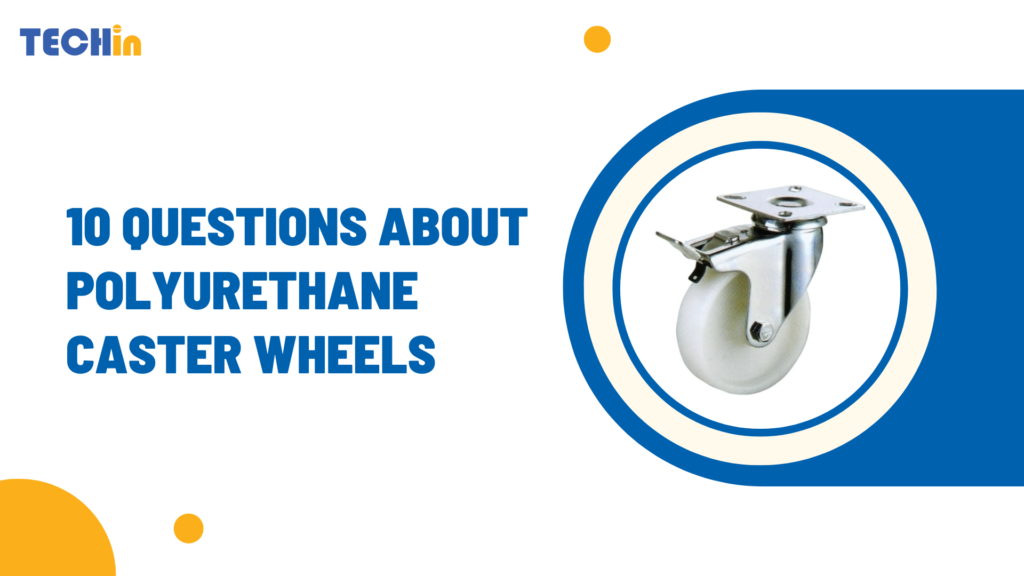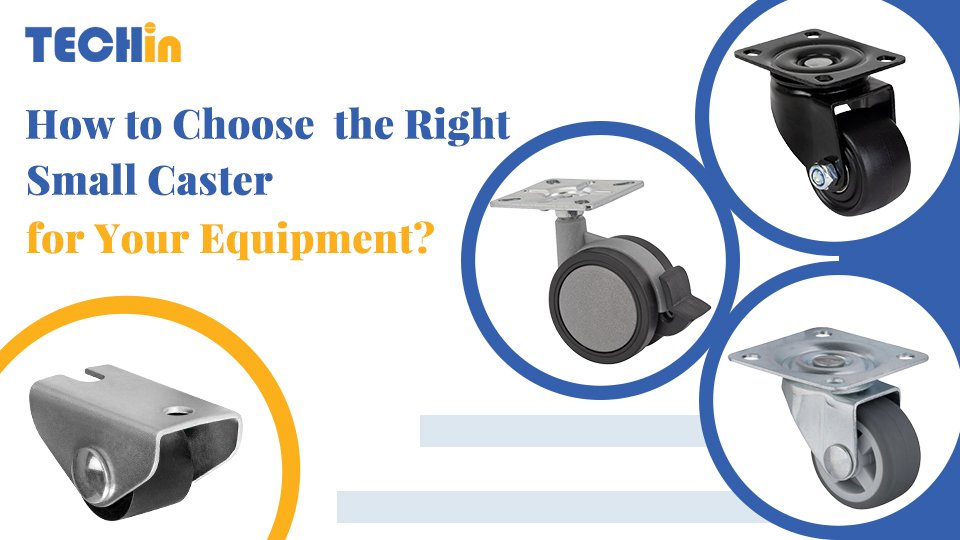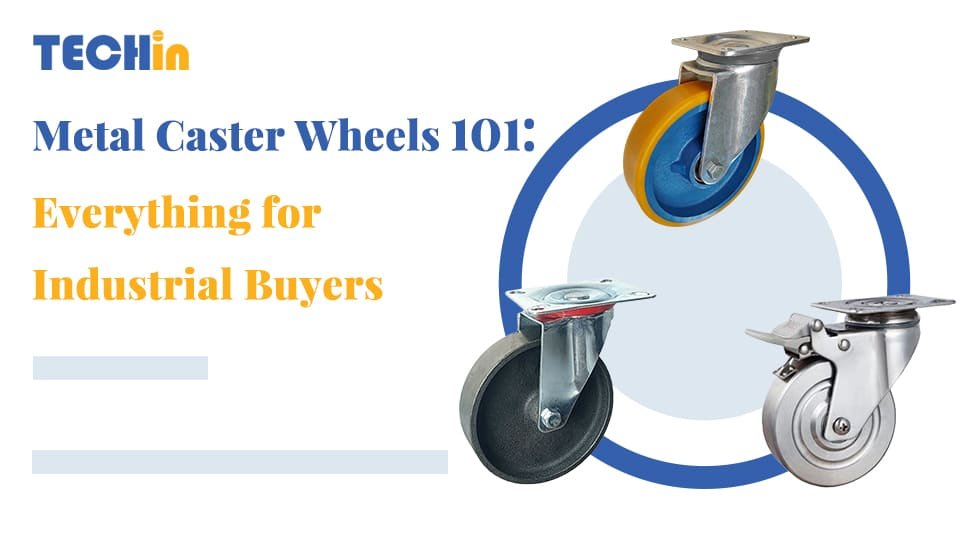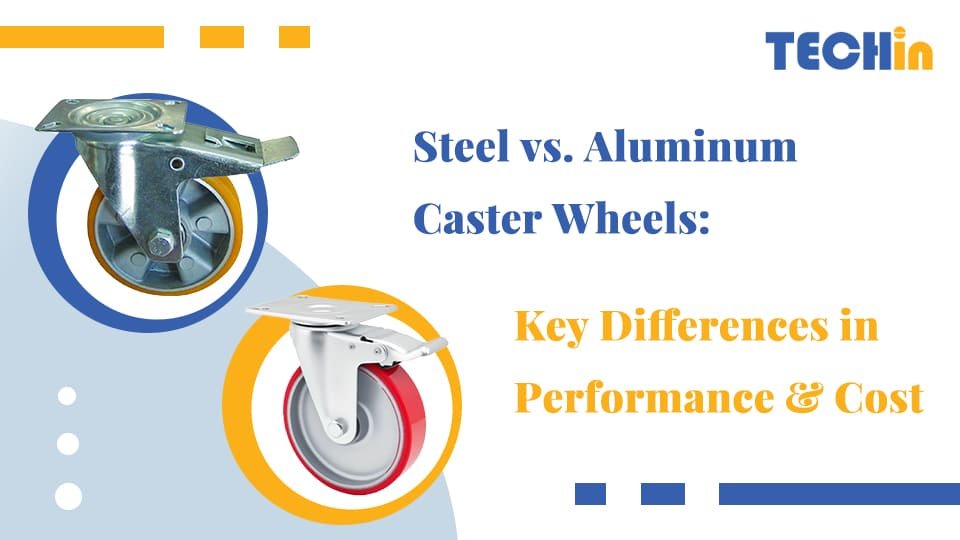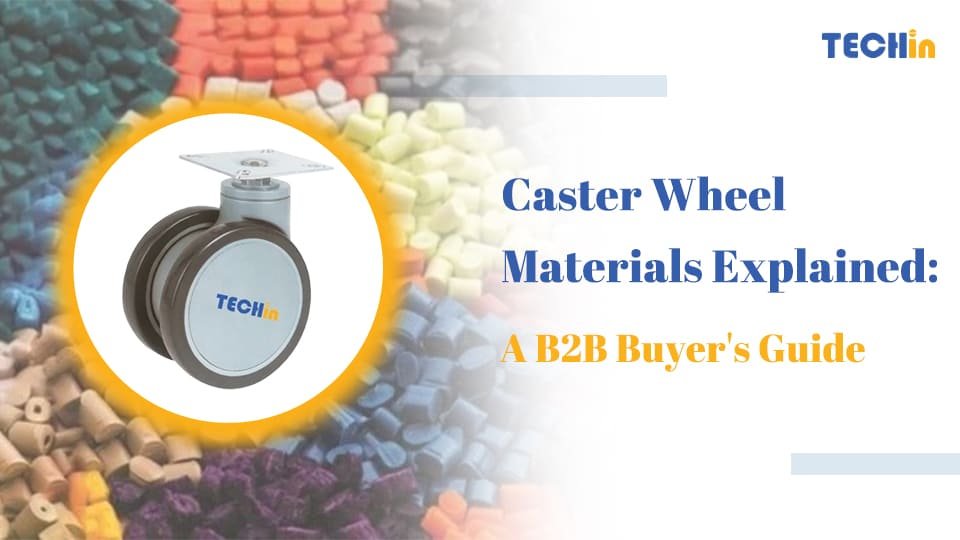Polyurethane caster wheels are a popular choice across many industries because they are tough, long-lasting, and versatile. Whether you need caster wheels to move heavy loads in a warehouse, to roll quietly in a hospital, or to protect your office floors, polyurethane wheels have a lot to offer. In this guide, we’ll look at the advantages of polyurethane caster wheels, compare them to other materials, and answer some common questions to help you make the best choice.
Advantages of Polyurethane Caster Wheels:
Polyurethane caster wheels offer a variety of advantages over alternative materials. Below are the key benefits explained in detail:
- Higher Load Bearing Capacity: Polyurethane wheels outperform rubber and plastic when it comes to carrying heavier loads. They distribute weight evenly, ensuring that carts, machines, and other equipment remain stable even under substantial weight. This makes polyurethane wheels perfect for industries like logistics, manufacturing, and retail, where the need to transport heavy goods is frequent.
- Noise Reduction: Polyurethane wheels are much quieter than metal or plastic wheels. This is particularly important in environments where noise control is essential, such as hospitals, offices, and libraries. By reducing operational noise, polyurethane wheels create a more comfortable environment for workers and visitors.
- Floor Protection: One of the standout features of polyurethane wheels is their ability to protect sensitive floors. Whether you’re rolling over delicate hardwood, tiles, or epoxy floors, polyurethane distributes the pressure evenly, reducing the risk of scratches, scuffs, or dents.
- Better Grip and Traction: Polyurethane wheels offer superior traction on various surfaces, from smooth warehouse floors to uneven outdoor terrain. This grip ensures safer operation, reducing the risk of slips or uncontrolled movements, which is especially important in industries like construction or logistics.
- Chemical and Corrosion Resistance: Polyurethane is naturally resistant to many harsh chemicals and corrosive substances. This makes these wheels ideal for industrial environments where exposure to oils, solvents, or other chemicals is common. Unlike rubber wheels, polyurethane does not degrade when exposed to such substances.
- Durability Against Wear and Tear: Polyurethane caster wheels are designed for heavy use, offering exceptional durability against wear and tear. Even after extended periods of use under heavy loads, polyurethane wheels resist cracking, tearing, or deforming, ensuring they last longer than other materials like rubber.
- Versatility in Indoor and Outdoor Environments: Polyurethane wheels are not limited to indoor use. Their durability makes them suitable for outdoor environments, where they can resist moisture, harsh weather conditions, and rough terrain. This versatility makes them a top choice for industries that require equipment mobility both indoors and outdoors.
| Advantage | Description | Best Use Cases |
|---|---|---|
| Load Bearing Capacity | Can carry heavier loads than rubber or plastic. | Warehousing, Manufacturing, Retail |
| Noise Reduction | Operates quietly, reducing noise in sensitive environments. | Hospitals, Offices, Libraries |
| Floor Protection | Soft material prevents scratches, scuffs, and dents on delicate surfaces. | Hospitals, Retail, Residential |
| Grip and Traction | Provides excellent traction on both smooth and rough surfaces. | Warehousing, Construction, Logistics |
| Chemical Resistance | Resists damage from exposure to oils, solvents, and corrosive materials. | Manufacturing, Chemical Processing |
| Durability | Withstands wear and tear, remaining durable under heavy use. | Warehousing, Manufacturing, Retail |
| Indoor/Outdoor Versatility | Performs well both indoors and outdoors, handling weather and rough terrain. | Construction, Logistics, Retail |
Polyurethane caster wheels are highly durable, provide noise reduction, protect floors, and offer excellent load-bearing capacity. They are resistant to chemicals and corrosion, making them ideal for both indoor and outdoor applications, with better grip and traction across various surfaces.
Now that we’ve covered the many advantages of polyurethane caster wheels, let’s answer some common questions about how they work and how you can use them in different situations.
10 Questions About Polyurethane Caster Wheels
1. What are polyurethane caster wheels?
Polyurethane caster wheels are wheels made from a tough and flexible plastic material called polyurethane. These wheels are often used on carts, trolleys, machinery, and equipment that need to be moved smoothly and safely across different types of surfaces. Polyurethane combines the elasticity of rubber with the toughness of metal, providing a balance of strength and smooth mobility that is ideal for many industrial and commercial applications.
2. What types of equipment are suitable for polyurethane caster wheels?
Polyurethane caster wheels are used in a wide range of equipment across different industries:
- Industrial Carts and Trolleys: Commonly used in warehouses and factories for transporting heavy goods and materials.
- Medical Equipment: Polyurethane wheels are used on hospital beds, medical carts, and other healthcare equipment for smooth, quiet mobility.
- Office Furniture: Chairs, tables, and workstations often have polyurethane wheels to enable easy movement while protecting delicate office flooring.
- Machinery and Heavy Equipment: Used in manufacturing facilities to move heavy machinery or equipment with ease.
- Material Handling Equipment: Platforms, dollies, and lift tables often feature polyurethane caster wheels for efficient load transportation.
| Equipment Type | Common Application | Benefits of Polyurethane Wheels |
|---|---|---|
| Industrial Carts & Trolleys | Moving heavy goods in warehouses and factories. | High load-bearing capacity, durability. |
| Medical Equipment | Hospital beds, medical carts, diagnostic machines. | Quiet operation, floor protection. |
| Office Furniture | Chairs, tables, workstations. | Noise reduction, floor protection, easy movement. |
| Heavy Machinery | Transporting heavy equipment in industrial settings. | High durability, load-bearing capacity. |
| Material Handling Equipment | Platform trucks, dollies, lift tables for transporting loads. | Superior grip, chemical resistance, long lifespan. |
3. How do polyurethane caster wheels compare to rubber?
Polyurethane caster wheels offer several advantages over rubber wheels:
- Durability: Polyurethane is more resistant to wear, making it last longer than rubber in demanding environments.
- Load Capacity: Polyurethane wheels can carry much heavier loads without deforming.
- Chemical Resistance: Polyurethane resists oils, solvents, and chemicals, whereas rubber degrades when exposed to such substances.
- Traction: Both materials offer good traction, but polyurethane is less prone to flat spots when used under heavy loads for long periods.
4. Are polyurethane casters better for heavy-duty applications?
Yes, polyurethane casters are excellent for heavy-duty applications due to their high load-bearing capacity and resistance to wear and tear. Whether used in factories, warehouses, or industrial plants, polyurethane caster wheels are built to handle the stresses of moving heavy equipment or goods. Their durability ensures a longer lifespan, even when subjected to the harsh conditions of heavy-duty environments.
5. Do polyurethane caster wheels protect floors?
Polyurethane caster wheels are specifically designed to protect floors. Unlike metal or hard plastic wheels, which can leave marks or scratches, polyurethane wheels distribute weight evenly and are soft enough to avoid damaging sensitive surfaces like hardwood, tile, or epoxy-coated floors. This makes them a preferred choice for hospitals, retail spaces, and any environment where floor protection is a priority.
6. Can polyurethane caster wheels be used outdoors?
Yes, polyurethane caster wheels are suitable for outdoor use. Their durability allows them to withstand exposure to moisture, temperature changes, and rough terrain. They are commonly used in construction sites, loading docks, and other outdoor environments. Moreover, polyurethane’s resistance to corrosion and chemicals ensures that the wheels perform well even when exposed to harsh outdoor elements.
7. Do polyurethane casters get flat spots?
Flat spotting occurs when wheels remain stationary under heavy loads for extended periods, causing a flat section to develop. While polyurethane wheels can experience flat spotting, they are generally more resistant to this issue compared to rubber wheels. High-quality polyurethane wheels are designed to minimize flat spots, and rotating equipment regularly can prevent this problem.
8. How long do polyurethane caster wheels last?
The lifespan of polyurethane caster wheels can vary depending on the environment and load, but they generally last much longer than rubber wheels due to their high resistance to wear, chemicals, and heavy loads. In typical industrial settings, polyurethane caster wheels can last several years, significantly reducing the need for frequent replacements.
9. What industries commonly use polyurethane caster wheels?
Polyurethane caster wheels are used in a variety of industries, including:
- Manufacturing: For moving machinery and transporting heavy materials.
- Healthcare: For hospital beds, medical carts, and other equipment requiring quiet, smooth operation.
- Retail: For shopping carts, display units, and stock transport.
- Warehousing: For pallets, carts, and equipment used to move goods.
- Logistics: For efficient movement of goods in shipping and handling facilities.
10. How to choose polyurethane caster wheels?
When selecting polyurethane caster wheels, consider the following:
- Load Capacity: Ensure the wheels can handle the total weight of the equipment.
- Floor Type: If floor protection is a priority, ensure the wheels are soft enough for your flooring type.
- Environmental Conditions: Choose wheels with chemical resistance if the environment involves oils or corrosive substances.
- Indoor vs Outdoor Use: If using the wheels outdoors, make sure they can handle exposure to moisture and rough terrain.
- Swivel vs Fixed: Consider whether you need swivel casters for better maneuverability or fixed casters for straight movement.
| Factor | Description |
|---|---|
| Load Capacity | Choose wheels that can support the weight of your equipment and goods. |
| Floor Type | Ensure the wheel material is compatible with your floor surface (e.g., hardwood, tile). |
| Environmental Exposure | Select wheels resistant to chemicals or outdoor elements if necessary. |
| Swivel vs Fixed | Swivel wheels offer more maneuverability, while fixed wheels provide stability. |
Summary
Polyurethane caster wheels are a great choice for many industries. They can carry heavy loads, reduce noise, and protect your floors. You can use them inside or outside. Knowing the key features and benefits of polyurethane caster wheels will help you choose the right ones for your needs.

